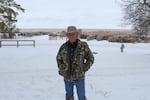
Robert "LaVoy" Finicum was the occupation's de facto spokesperson. After he was killed Jan. 26, Finicum became an even more critical figure in the splintered movement.
Amelia Templeton / OPB
Robert LaVoy Finicum, who died Tuesday in a confrontation with FBI and state police on the highway between Burns and John Day, was a man whose life was transformed by the 2014 standoff between Cliven Bundy and federal officials in Nevada.
Finicum was reportedly killed during an officer involved shooting with Oregon State Police while traveling with Ammon and Ryan Bundy to meet with ranchers and others in Grant County. According to police, the shooting took place around 4:30 p.m. Tuesday along Highway 395.
At the occupied Malheur National Wildlife Refuge, Finicum stood out as one of the few ranchers in a crowd of army vets and anti-government activists.
Finicum quickly emerged as a key surrogate for occupation leader Ammon Bundy and a spokesman for the militants.
Related: How LaVoy Finicum Became A Key Player In The Malheur Occupation
"You don't stand here, unless you believe in your heart of hearts what you're doing is true. You're going to have to weather the storm of intense persecution, and criticism and demonization," he said in an interview last week. "You don't draw a line in the sand unless you're willing to go all the way."
Finicum participated in many of the militants' activities, helping remove a fence at the edge of the refuge and taking down cameras — allegedly used for surveillance, according to the militants — from a nearby power station.
At the refuge, Finicum wore a cream colored cowboy hat, eyeglasses and a gun belt. At times, he smiled and spoke softly. From behind the wheel of his quad cab pickup, he said he didn't much care for country music and preferred British pop star Adele. In his youth, he said he'd worked as a property manager in the Portland area.
Finicum spoke about the possibility of a war between the people of the United States and its government, and wrote an apocalyptic novel, available on Amazon, titled "Only By Blood and Suffering." He urged reporters to consider setting aside enough food and water to last six months.
Before 2014, Finnicum had never met Cliven Bundy face-to-face, though his cattle grazed on thousands of acres in Mohave County, Arizona, not far from the Bundy's ranch. He came to visit the Bundys the day before the standoff started.
"I said Cliven, don't let them take your cows," Finicum recalled in an interview with OPB. "He says saddle up your horse and be here early in the morning. I was the first cowboy to show up in the dark."
In fall 2015, Finicum followed in Bundy's footsteps and chose to stop complying with his lease contract with the Bureau of Land Management, in spite of a long positive relationship with the agency.
"The people I deal with in Arizona, they're great, they're wonderful," he told OPB. "It's not whether they do good, or bad, it's should they have the power?"
He called federally owned lands in the West an unaccountable empire with "dire consequences for our citizens."
Finicum, by his own account, was among the first advance team of militants that occupied the Malheur refuge Jan. 2.
But he said he had no forewarning that Ammon Bundy planned the occupation, and was initially reluctant to drive all the way to Oregon for what he believed was a small, peaceful protest. Finicum said his daughters learned of his participation from news reports.
"It was quite a shock to my whole family," he said.
Finicum said he and Ryan Bundy drove to Oregon together in his truck, thinking they were only staying for a day or two. Ryan Bundy came with just one change of clothes.
Finicum, a self-described "prepper," said he always traveled with bedrolls and supplies in his truck, and offered Bundy his extra socks.

Arizona rancher LaVoy Finicum said his four foster children were removed from his home during the armed occupation of a wildlife refuge near Burns.
John Sepulvado / OPB
He said as he drove out across the snow flats toward the refuge, which he'd never visited before, he thought about what he was about to do. He spotted a bald eagle on a fence post. It took flight as he drove by, and Finicum said he took it as a sign to continue.
"I've cast my lot with them, and we've crossed the Rubicon, and there's no turning back," he said. "The public, the whole world, the country needs to understand that these buildings never never go back to the federal government."
Finicum was the father to 11 children and a grandfather many times over, and was expecting at least one grandchild shortly.
He and his wife Jeanette were also foster care parents for troubled boys. Finicum estimates that over the past decade, more than 50 boys came through their ranch near Chino Valley, Arizona. The boys often landed there from mental hospitals, drug rehabs and group homes for emotionally distressed youth.
Finicum said payments for foster care were his main source of income.
A social worker removed the last of the foster children from the ranch beginning Jan. 4, with the last child transferred out of Finicum's home Jan. 9.
Police have not yet released the full details surrounding Finicum's death.